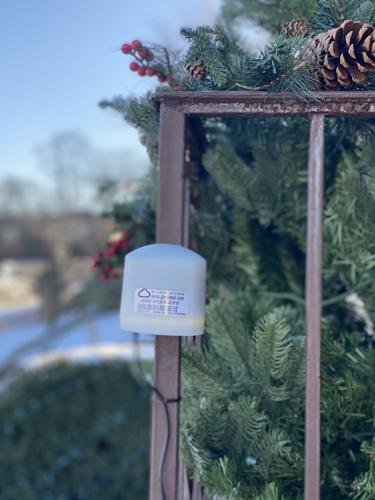An environmental advocacy group is giving residents the equipment to monitor their own air as part of a larger movement to analyze the region’s air quality.
Philadelphia-based nonprofit Physicians for Social Responsibility Pennsylvania is working with local environmental organizations to seek volunteers willing to have small air quality monitors installed at their homes, with a focus on air quality surrounding the Keystone Sanitary Landfill in Dunmore and Throop, and Invenergy’s Lackawanna Energy Center natural gas-fired power plant in Jessup.
Produced by PurpleAir of Draper, Utah, the cylindrical, white air quality monitors are about the size of a soup can and require power and a Wi-Fi connection.
Physicians for Social Responsibility Pennsylvania, which describes itself as professionals who “champion the health of all communities by advocating for socially and environmentally just actions,” plans to begin installing the monitors Wednesday. Executive Director Tonyehn Verkitus, an Archbald resident, said participants will receive an invitation to a platform where they can view their air quality information online and add images and notes to accompany their data.
“You can go on this platform, see you’re not the only one suffering with these issues; you can leave notes,” she said. “Then it becomes a movement, and then people want to help improve the health of their community.”
Verkitus hopes the project will prompt residents to “watch the data and complain.”
“The biggest problem is people don’t advocate for themselves. … It’s not that they’re not willing to,” she said. “If you’ve talked about it and talked about it and you’re getting no results, you just get worn down.”
They will perform data analysis on the monitors’ findings to determine patterns, which will help them figure out where they should place additional monitors, she said.
“Then we can use that data to advocate for better permitting, regulations,” Verkitus said. “And, give the data to people like Friends of Lackawanna so they also can use it for their advocacy efforts.”
‘People are just starting to get sick of it’
Physicians for Social Responsibility Pennsylvania has already placed air quality monitors across the state, but it wasn’t until this year that they began setting them up in Northeast Pennsylvania, Verkitus said.
“We have them all over, but we haven’t done a huge push here,” she said.
In the spring, they placed three air quality monitors across the Midvalley and Scranton, said analytical chemist Christina DiGiulio, an environmental scientist at Physicians for Social Responsibility Pennsylvania.
The organization initially focused on the Lackawanna Energy Center following the release of PennEnvironment Research & Policy Center’s “Pennsylvania’s Dirty Dozen,” Verkitus said.
Released in May, the “dirty dozen” named the natural gas power plant in Jessup as the fourth-largest greenhouse gas polluter in the state.
In the fall, their organization connected with Friends of Lackawanna — a grassroots group formed in 2014 to oppose the Keystone Sanitary Landfill and its now-approved expansion.
Friends of Lackawanna sought volunteers for air monitors in October, and DiGiulio said they installed four monitors around Dunmore and Throop that month.
With hundreds of odor complaints surrounding the landfill in recent months, which culminated Dec. 13 when the state Department of Environmental Protection said the landfill violated state regulations and its own permitting by failing to control odors, Friends of Lackawanna put out a second call for volunteers Dec. 8.
They received about 36 requests in the first 24 hours and at least 15 more since then, Verkitus said.
“There were so many people noticing these horrible scents,” she said. “People are just starting to get sick of it.”
Her organization has around 15 monitors in hand with 40 more ordered using funding from grants and donations. Each monitor retails for $299, though they save about 10% by buying in bulk, she said.
“There’s actually no way we can cover all those locations next week, so what we’re doing is prioritizing based on proximity to the landfill or the gas power-generating plant,” she said Friday.
‘Taken advantage of by polluting industries’
The air quality monitors log particulate matter, volatile organic compounds — or VOCs — and air pressure, temperature and humidity, according to the manufacturer.
VOCs are carcinogenic volatile organic chemicals in the air, DiGiulio said.
“When you’re talking about smells, we’re talking about VOCs,” she said. “You’re going to smell them, you’re going to taste them on your tongue, you’re going to feel them in your mucous membranes — and that means it’s absorbing into your body.”
DiGiulio wants the research to spur more investigations by government agencies. If their findings ultimately are at odds with the agencies, “Go above and beyond — prove us wrong,” she challenged. “Prove us wrong with your technology.”
Dunmore council Vice President Janet Brier sent a letter this month to Gov. Josh Shapiro urging him to use his executive power to have the DEP carry out more comprehensive, round-the-clock electronic monitoring around the Keystone Sanitary Landfill.
“My thought is that it’s pretty disappointing that this type of monitoring has to come from an independent nonprofit when we have a government entity that is charged with monitoring and protecting the people of Northeastern Pennsylvania,” she said.
Jessup council President Jerry Crinella said he is not opposed to any individual industry or particular business, but he is concerned about the environment in general and the impact it has on residents.
“I don’t have any opposition specifically to (Lackawanna Energy Center),” he said, referencing the “dirty dozen” study. “It makes me concerned about them as to the amount of pollution, and (the site of the plant) was a concern from the beginning, and the fact that it is producing a large amount of particulate matter.”
He lauded the upcoming air monitoring network.
“If there is an organization that wants to monitor for any kind of air pollution from any source, I think it’s great,” Crinella said.
Pat Clark, a leader of Friends of Lackawanna, said his group is honored to work with Physicians for Social Responsibility Pennsylvania. It’s creating a resilient network of monitors, he said.
“Northeast Pennsylvania has been taken advantage of by polluting industries since last century,” he said, describing landfill odors.
Oftentimes, if people can’t see something, they can ignore it, he said.
“Ironically, what turned this whole thing around from the monitoring standpoint is, yeah, you can’t perhaps see everything, but you sure as hell can smell it,” Clark said. “Our senses lead us to want to know what’s going on, and I think that’s a direct correlation in this case.”
Clark believes these projects will grow in popularity because people want to know what is going on around them. By providing a measure of that, it can lead to more informed choices, he said.
“We do have a direct right to clean air. If you’re a site that is negatively impacting our ability to have clean air, I think that should matter,” Clark said. “Measuring this stuff and giving people the ability to understand what’s going on directly goes to that point. You either have confidence what you’re breathing is clean, or bring awareness that perhaps it may not be.”


